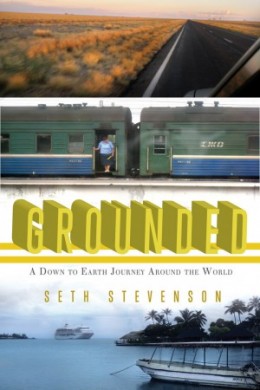
04.08.10 | 10:18 AM ET
The author's new book chronicles his surface journey around the world. Frank Bures asks him about it -- and why he thinks air travel isn't really travel.
Seth Stevenson was coasting into his 30s when he began to get that feeling many of us get. You know, the one that makes you want to take your life by the lapels and shake it, to heave all anchors weighing you down. It’s the urge to get out on the road.
Stevenson and his girlfriend gave notice. They tied up loose ends. They turned in the keys to their apartment. Then they packed two backpacks, went down to a harbor on the Delaware River, and got on a boat to begin a circumnavigation of the earth—without leaving its surface.
Stevenson writes about the trip in his new book, Grounded: A Down to Earth Journey Around the World, a great read and a fascinating look at the globe from a perspective few people see it nowadays: from freighters, ferries, bikes, buses and trains.
“We’ve forgotten the benefit of surface travel,” Stevenson concludes. “It forces you to feel, deep in your bones, the distance you’ve covered; and it gradually eases you into a new context that exists not just outside your body, but also inside your head.”
Stevenson is a contributing writer for Slate, has received multiple Lowell Thomas Awards from the Society of American Travel Writers and has been included three times in the “Best American Travel Writing” anthologies. I interviewed him via email.
World Hum: You say in the book that for you, riding in an airplane isn’t really traveling. What do you mean by that?
Seth Stevenson: Flying is like teleporting between two points. The flight itself is an empty, meaningless interlude. Once the flight is over, you never think or speak of it again—unless it’s to complain about the turbulence or the shrieking child sitting behind you. By contrast, being on a ship or a train moving between point A and point B is a journey unto itself, full of ground-level scenery, local culture and moments of quiet contemplation. A surface voyage is often memorable, and on occasion transcendent.
Freighter travel seems to me like a great way to go. Aside from it taking a long time, why do you think so few people travel that way?
The time factor is a major stumbling block. Not everyone can spare nine days to cross the Atlantic on the way to a European vacation. There’s also no internet access on freighters, no casinos, no trivia contests, no gourmet restaurants, no Broadway shows—all things of interest to the average cruise ship passenger. Above all, though, most people simply aren’t aware of freighter travel as a possibility. It’s not particularly well publicized, and only a few travel agencies and shipping companies can book you passage aboard a freighter.
Still, I’ve been recommending freighters to anyone who’ll listen. It’s an amazing experience to be out on the open ocean on a working ship, chatting with the officers on the navigation bridge, eating with the crew in the mess room, feeling like you’re riding on one of the stallions of the global economy.
What’s the difference between arriving at a place by boat or train, versus through the airport?
Airports are generally built outside cities, as separate holding pens contributing to sprawl. You’re not really in the city until after a taxi ride (sometimes a long one). By contrast, train stations are often built in the middle of thriving city neighborhoods. You arrive as a part of the community. As your train rolls into town, you also frequently get a ground-level introduction, through your seat window, to the look and feel of the place and its inhabitants.
As for arriving by ship: Some cruise ship terminals are actually quite a bit like airports—with duty free shops, clothing boutiques and fast food restaurants. But container ship ports don’t cater at all to passenger arrivals. You get dropped off in a remote, industrial part of a city, and wind up walking past container stacks and rusty machinery. We had to ask the freighter crews how to get anywhere on land. Once, we found a city bus depot next to a port and flagged down an empty bus headed downtown to begin its scheduled route.

I was surprised how, when you got to Japan after going overland from Russia, you said that the world felt smaller than you thought it would. Why was that?
We think of Japan as an impossibly distant place. The other side of the world. Taking a 14-hour flight to Tokyo gives us little understanding of the true distance. But taking a ship across the Atlantic, and then trains across Europe and Asia, makes the distance a comprehensible thing, fixed and finite in your mind. You can feel how far away Japan is, and it turns out to be not nearly as far as you’d imagined. You can roll from the cobblestone streets of Europe to the steppes of Siberia to the glass skyscrapers of Tokyo in not much more than a week. And when you watch each scene melt into the next, they feel more connected and part of the same small world—less like dots on a map to hop between as you sit inside the hermetic cabin of a jumbo jet.
What parts of the journey do you remember most fondly?
There are countless wonderful memories, but here’s one that comes to mind: Driving across the Australian Outback, we stopped for the night at a tiny roadhouse about a million miles from civilization. There we ended up drinking with a trio of jackaroos (Americans would call them “cowboys”) who delighted us with their stories about rounding up cattle on motorcycles, wrestling bulls to the ground, and shooting kangaroos for meat. It was a funny, serendipitous interlude in the dead center of a barren wasteland.
And do you feel now like you know how big the world is?
When I look at a spinning globe now, and trace my finger along its curve, I see myself moving along its surface. Floating on freighters across vast oceans. Rolling on trains across Russian expanses. Road-tripping across the Outback. I have made myself part of the map. I do feel I understand the scope of the world—and the interconnectedness of its civilized outposts—in a way that I never could have before.




